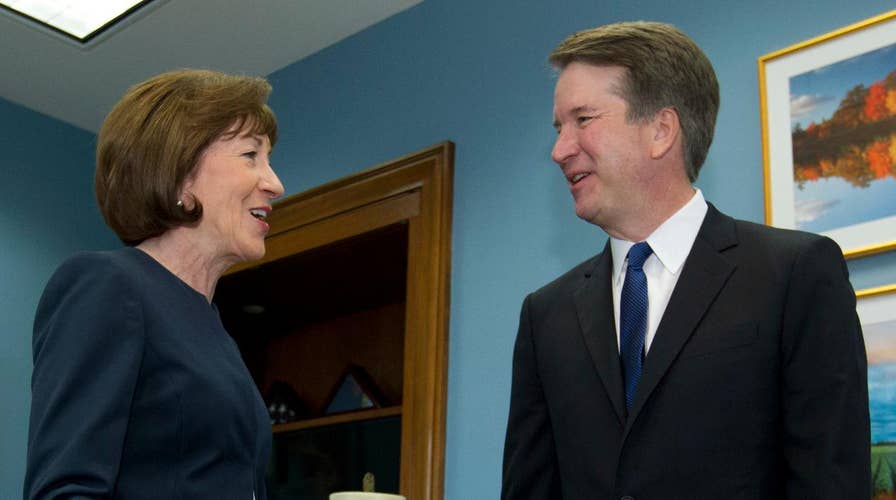Judge Kavanaugh nomination: Key players
Does Judge Bret Kavanaugh have enough votes in the senate to get a seat on the Supreme Court? Here’s a look at some of the undecided senators who could decide his fate.
The Senate’s final verdict on Supreme Court nominee Brett Kavanaugh – whose high-stakes, high-wire confirmation hearing begins Tuesday – will hinge on the views of just a handful of lawmakers.
As it stands, Republicans hold a razor-thin, 50-49 majority with one vacancy. Arizona Republican Gov. Doug Ducey will soon appoint a successor to the late Sen. John McCain, R-Ariz., but even then the GOP majority can suffer few defections.
These are the senators to watch:
Sens. Susan Collins, R-Maine, and Lisa Murkowski, R-Alaska
These senators can be mavericks in their own right. Further, they fret about how health care issues and access to reproductive assistance are challenging in their sprawling, rural states. Both Collins and Murkowski are moderates. A defection by either or both of these senators could spell problems for the confirmation of Kavanaugh.
Sen. Rand Paul, R-Ky. Paul, too, sometimes bucks his party and can be unpredictable on how he will cast his ballot. But the Kentucky Republican announced he will support Kavanaugh. In the past, Paul has flashed his libertarian streak, especially voicing concern over privacy and the use of government surveillance. If Kavanaugh can avoid setting off those Paul alarm bells in the hearing, he is likely to preserve that key support.
Sen. Dean Heller, R-Nev. Heller is likely the most-endangered Republican this cycle, representing a battleground state where Democrats performed well in 2016. That said, he has signaled likely support for President Trump’s pick.
“His legal career combined with his educational credentials make him an exceptionally qualified nominee to fill the upcoming vacancy on the U.S. Supreme Court. At this point, I have no reservations in confidently supporting Judge Kavanaugh’s confirmation,” Heller said.
Then, there is the unknown senator. It’s believed Ducey will appoint someone to fill McCain’s seat soon. However, he may not. Appointment battles for coveted Senate seats sometimes spill off the rails, take longer than anticipated or stumble into previously unanticipated political potholes. (See Blagojevich, Rod and Burris, Roland.)
Moreover, the political disposition of that new senator is unknown. Arizona law does require Ducey to appoint a Republican since McCain was a Republican. It’s possible the appointee’s view on Kavanaugh could serve as a litmus test.
Things are fuzzier on the Democratic side of the aisle. It’s believed three to five Democrats could ultimately vote to confirm Kavanaugh. The reason? There are lots of conservative Democrats up in GOP or swing states:
Sens. Joe Manchin, D-W.Va., Heidi Heitkamp, D-N.D., and Joe Donnelly, D-Ind. These are the big three to watch on the Democratic side. That trio voted to confirm Supreme Court Justice Neil Gorsuch in April 2017. Those Democratic “defections” could be enough to confirm Kavanaugh even if Republicans lose a vote or two. All three also face stiff competition in the November midterm elections and are eager to prove their independent streak – but also mindful of the views of their own party’s voters.
Sens. Jon Tester, D-Mont., Claire McCaskill, D-Mo., and Bill Nelson, D-Fla. Likewise, the three senators in the next tier are in tough re-election battles. None have committed to vote one way or the other.
Something to keep in mind: it’s not as though a yea vote on Kavanaugh necessarily helps these Democrats win election. Republicans will not call off the dogs, simply because they voted to confirm Anthony Kennedy’s successor. Going along with Kavanaugh simply inoculates these vulnerable Democratic senators from criticism that they opposed Trump’s Supreme Court pick.
Sen. Doug Jones, D-Ala. Jones is the wild card – because his disposition is an unknown quantity. Jones won a special election to succeed Attorney General Jeff Sessions in the Senate in December. Thus, Jones never cast a ballot on Gorsuch. Kavanaugh is his first rodeo. Jones is a conservative Democrat in a major red state. And, unlike the other Democratic senators listed above, Jones isn’t up for re-election this fall.
“I’m prepared to vote for a conservative justice,” Jones said in an interview with Fox News. “The question is whether I’m prepared to vote for this justice.”















































